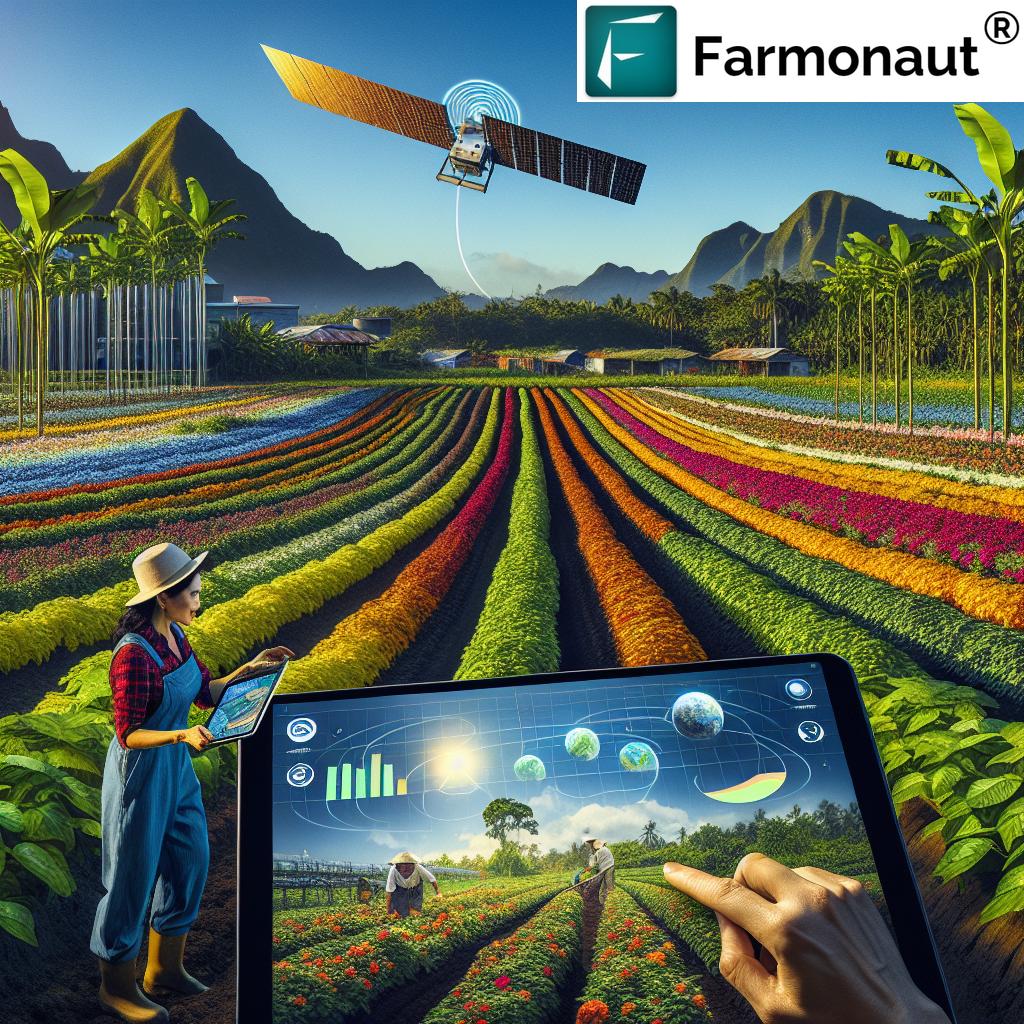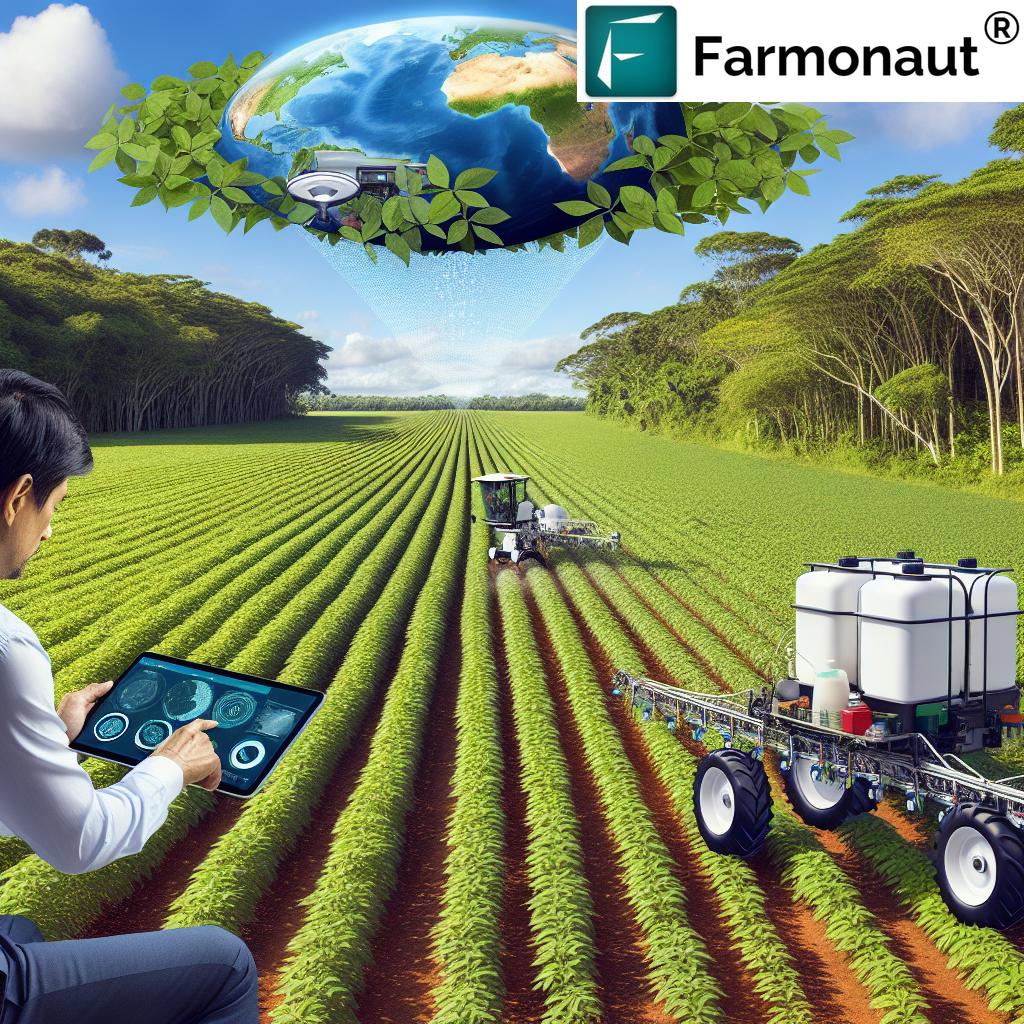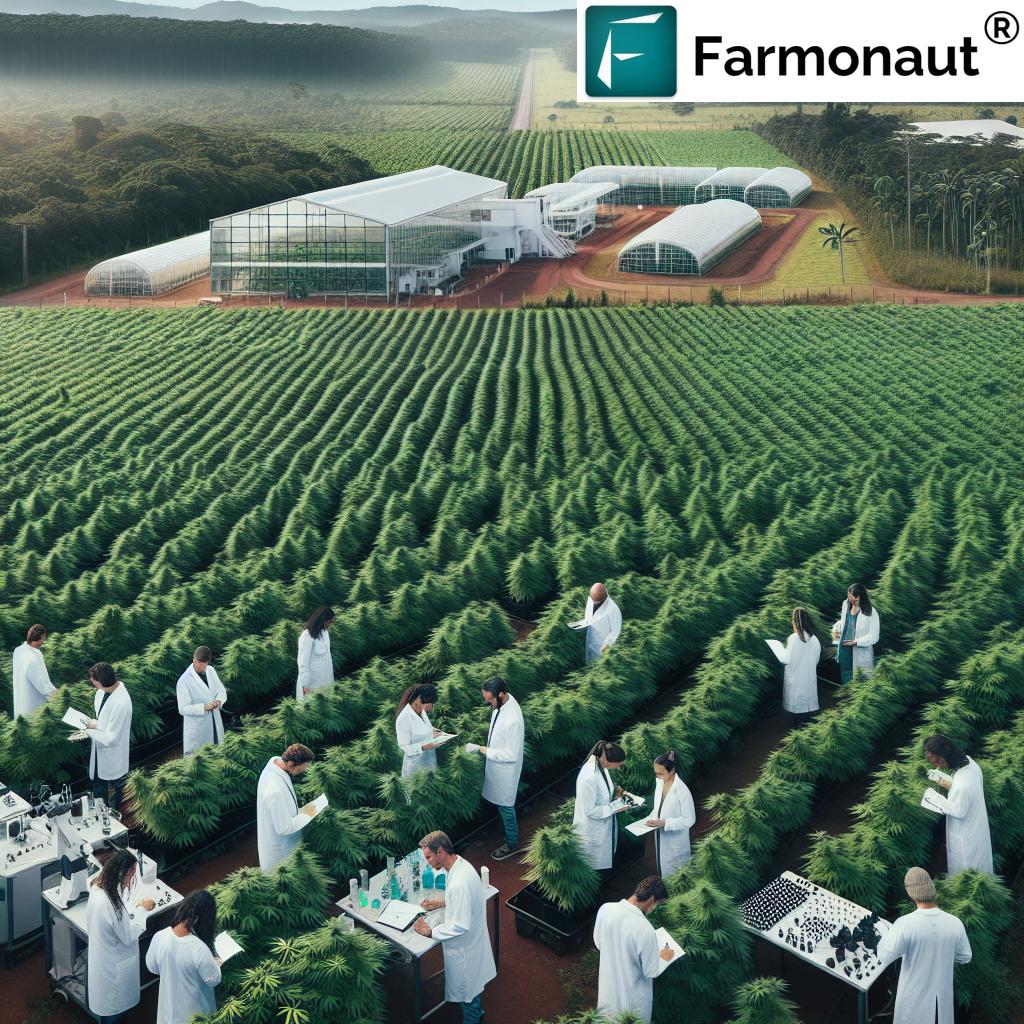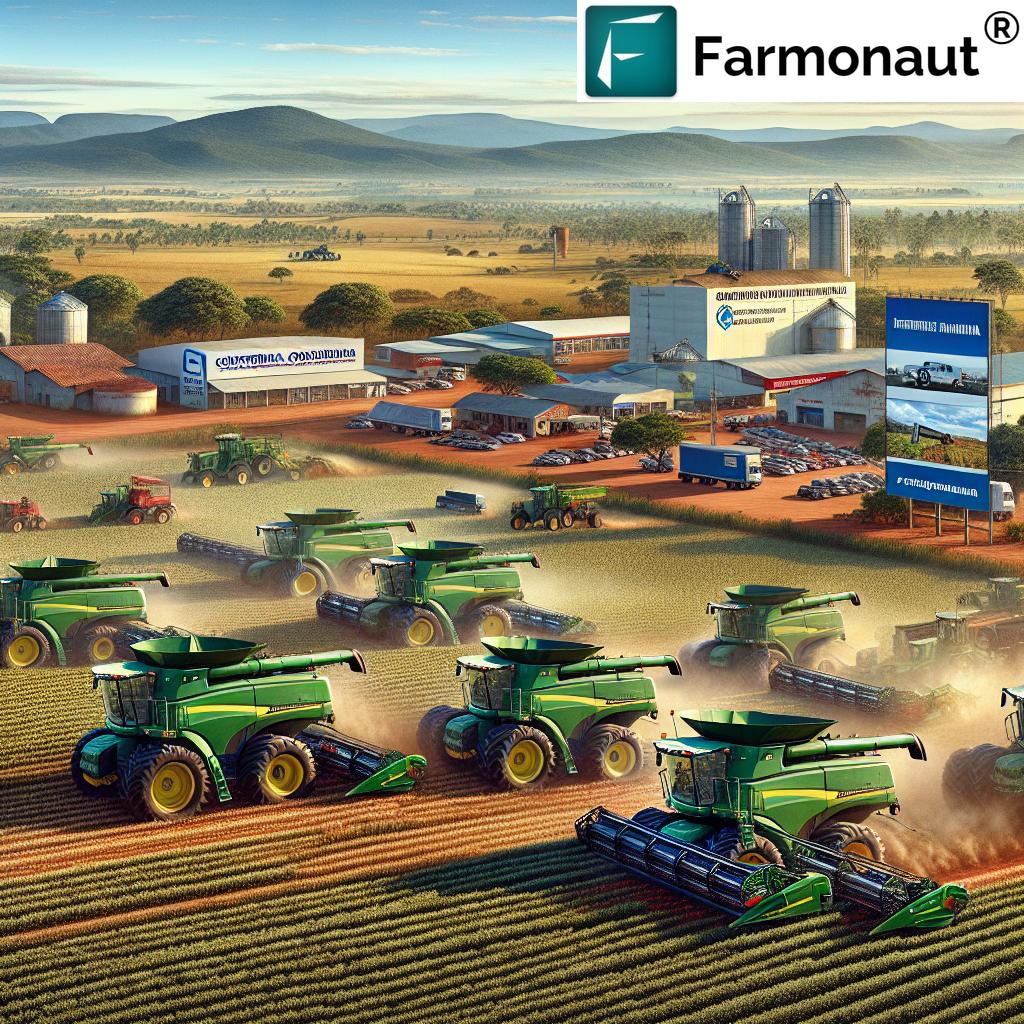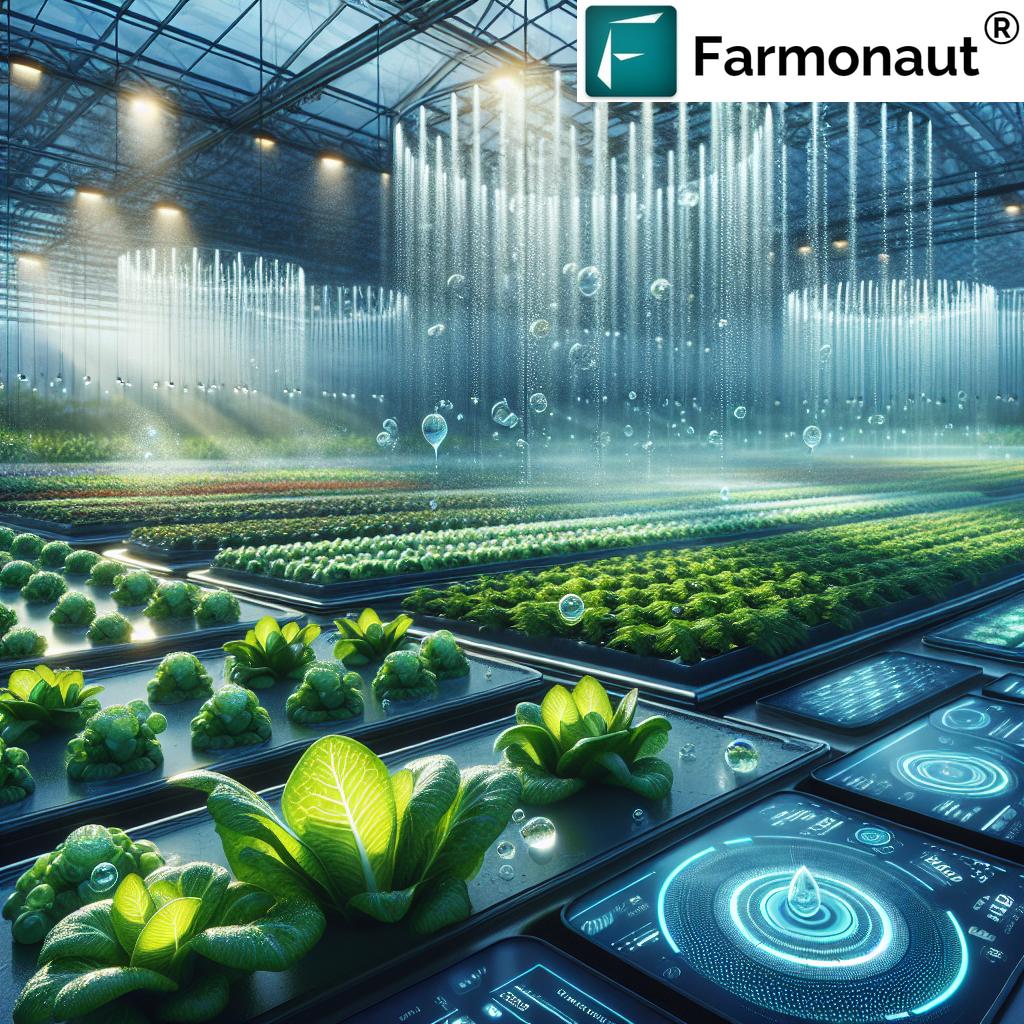Revolutionizing Brazilian Agriculture: Sustainable Practices for Soil Health and Productivity with Farmonaut’s Solutions
“Brazil’s sustainable agriculture project aims to restore 15,000 hectares of degraded pastures, improving soil health and productivity.”
In the heart of Brazil’s vast agricultural landscapes, a revolution is taking root. We’re witnessing a transformation that promises to reshape the future of farming in this South American powerhouse. As we delve into the world of sustainable agriculture practices, we’ll explore how innovative approaches are not only boosting productivity but also nurturing the very soul of the land – its soil.
At the forefront of this agricultural renaissance is Farmonaut, a pioneering agritech company that’s bringing cutting-edge satellite technology and data-driven insights to farmers across Brazil and beyond. Let’s embark on a journey to understand how these sustainable practices are changing the face of Brazilian agriculture, and how Farmonaut’s solutions are playing a crucial role in this green revolution.
The Brazilian Agricultural Landscape: Challenges and Opportunities
Brazil, with its expansive Cerrado savanna and rich Amazonian soils, has long been a global agricultural giant. However, years of intensive farming have taken their toll on the land. Degraded pastures, soil erosion, and diminishing water resources have posed significant challenges to the country’s farming communities. But where there are challenges, there are also opportunities for innovation and growth.
The need for sustainable agriculture practices in Brazil has never been more pressing. As the world grapples with climate change and food security issues, the country’s agricultural sector finds itself at a crossroads. The choice is clear: adapt and thrive, or continue down an unsustainable path.
Sustainable Agriculture Practices: A New Dawn for Brazilian Farmers
Sustainable agriculture is not just a buzzword; it’s a comprehensive approach to farming that considers the long-term health of the land, the prosperity of farmers, and the well-being of communities. In Brazil, this approach is taking shape through various initiatives and technologies. Let’s explore some of the key sustainable practices that are making a difference:
- Regenerative Farming Techniques: These methods focus on restoring soil health, increasing biodiversity, and improving water cycles. By mimicking natural ecosystems, farmers can create resilient and productive agricultural systems.
- Soil Health Improvement: The foundation of sustainable agriculture lies in healthy soil. Practices such as no-till farming, cover cropping, and crop rotation are being employed to enhance soil structure and fertility.
- Agricultural Water Conservation: In a country prone to both droughts and floods, efficient water management is crucial. Precision irrigation systems and water-saving techniques are being implemented to conserve this precious resource.
- Greenhouse Gas Reduction: Sustainable farming practices aim to reduce the carbon footprint of agriculture. This includes minimizing chemical inputs, adopting agroforestry systems, and improving livestock management.
These practices are not just theoretical concepts; they’re being put into action across Brazil, transforming farms and communities. Let’s take a closer look at how these sustainable approaches compare to traditional methods:
| Agricultural Aspect | Traditional Methods | Farmonaut’s Sustainable Solutions |
|---|---|---|
| Soil Health Management | Heavy tilling, chemical fertilizers | No-till farming, organic matter addition, satellite-based soil analysis |
| Water Conservation Techniques | Flood irrigation, limited monitoring | Precision irrigation, real-time soil moisture tracking |
| Crop Yield Improvement | Increased chemical inputs | Data-driven decision making, optimal resource allocation |
| Greenhouse Gas Emissions | High emissions from intensive practices | Reduced emissions through efficient resource use and carbon sequestration |
| Farmer Training and Support | Limited access to new technologies | Continuous education and AI-powered advisory systems |
| Ecosystem Restoration | Focus on single-crop systems | Promotion of biodiversity and natural habitat restoration |
| Resource Efficiency | Often wasteful due to lack of precision | Optimized resource use through satellite monitoring and AI |
| Long-term Productivity | Declining yields over time | Sustained productivity through soil health and ecosystem balance |
As we can see, the shift towards sustainable practices represents a significant improvement in various aspects of agriculture. But how are these changes being implemented on the ground? This is where technology and innovation come into play, and companies like Farmonaut are leading the charge.
Farmonaut: Bridging the Gap Between Technology and Sustainable Farming
In the quest for sustainable agriculture, technology plays a pivotal role. Farmonaut, with its advanced satellite-based farm management solutions, is at the forefront of this technological revolution in Brazilian agriculture. Let’s explore how Farmonaut’s innovative tools are supporting farmers in their journey towards sustainability:
- Satellite-Based Crop Health Monitoring: Farmonaut’s platform uses multispectral satellite imagery to provide real-time insights into crop health. This allows farmers to make informed decisions about irrigation, fertilizer use, and pest management, optimizing resource use and reducing waste.
- AI-Powered Advisory Systems: The Jeevn AI system offers personalized farm advice, weather forecasts, and crop management strategies. By analyzing satellite data and other inputs, it helps farmers improve productivity while adhering to sustainable practices.
- Blockchain-Based Traceability: For industries concerned with supply chain transparency, Farmonaut’s blockchain solutions ensure that every step of the product’s journey is traceable and secure.
- Resource Management Tools: From fleet management to carbon footprint tracking, Farmonaut provides comprehensive tools for efficient resource management, helping agribusinesses reduce their environmental impact.
These technologies are not just theoretical; they’re making a real difference in the fields of Brazil. By providing affordable access to precision agriculture tools, Farmonaut is democratizing sustainable farming practices, making them accessible to farmers of all scales.
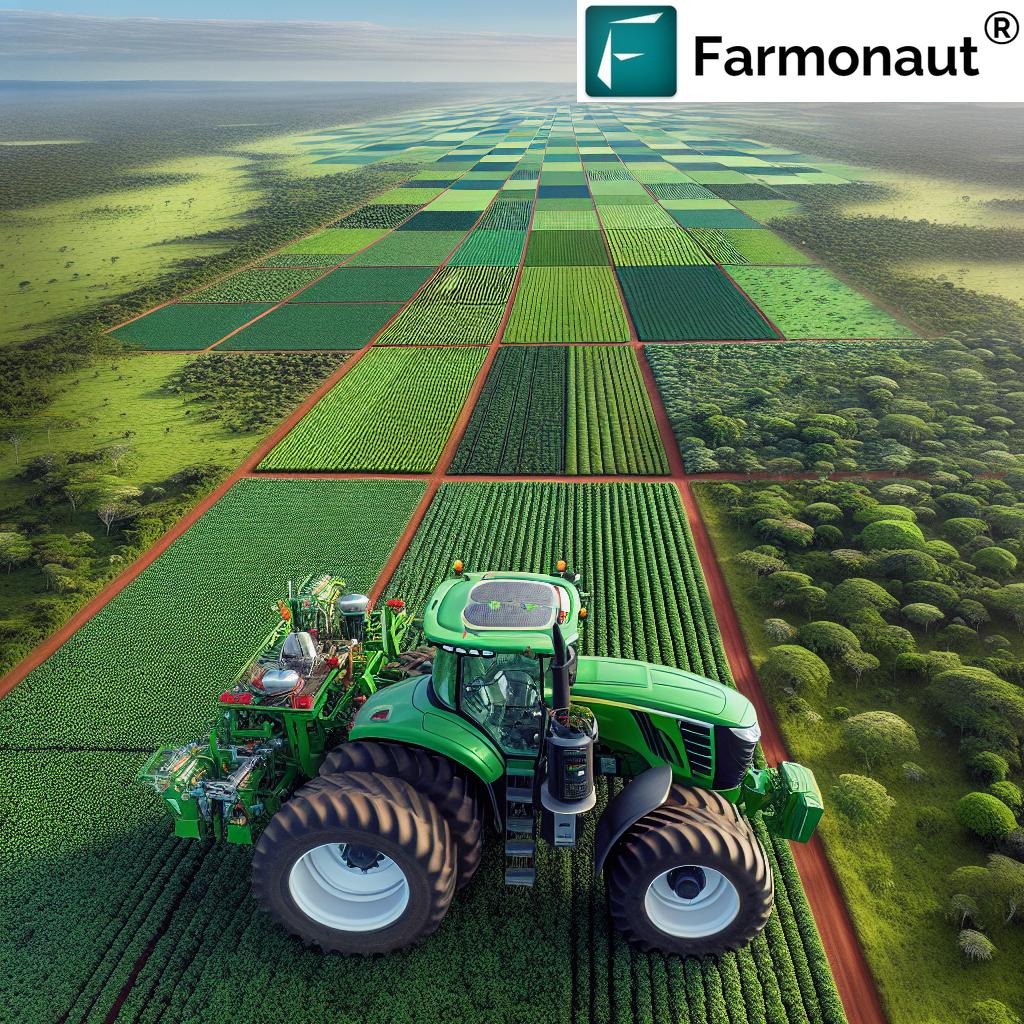
To get a better understanding of how Farmonaut’s solutions work in practice, let’s take a look at this informative video:
As we can see, Farmonaut’s approach to sustainable agriculture is comprehensive and data-driven. By providing farmers with real-time insights and actionable advice, the platform is enabling a shift towards more sustainable and productive farming practices across Brazil.
The Impact of Sustainable Practices on Brazilian Agriculture
The adoption of sustainable agriculture practices, supported by technologies like Farmonaut, is having a profound impact on Brazilian farming. Here are some of the key areas where we’re seeing significant changes:
- Improved Soil Health: By implementing regenerative farming techniques and reducing chemical inputs, farmers are seeing improvements in soil structure, fertility, and water retention capacity.
- Increased Crop Yields: Contrary to the misconception that sustainable practices lead to lower yields, many farmers are reporting increased productivity due to healthier soil and more efficient resource use.
- Water Conservation: Precision irrigation techniques and real-time soil moisture monitoring are helping farmers use water more efficiently, a crucial factor in Brazil’s diverse climate zones.
- Reduced Environmental Impact: Sustainable practices are helping to reduce greenhouse gas emissions from agriculture, contributing to Brazil’s climate change mitigation efforts.
- Enhanced Biodiversity: By moving away from monoculture systems and adopting more diverse cropping patterns, farmers are creating habitats that support a wider range of plant and animal species.
These impacts are not just beneficial for the environment; they’re also improving the livelihoods of farmers and rural communities. By adopting sustainable practices, farmers are reducing their input costs, improving their resilience to climate shocks, and often commanding premium prices for sustainably produced goods.
Scaling Up Sustainable Solutions: The Role of Training and Education
“The initiative trains field technicians and students to scale up sustainable farming solutions across Brazilian agricultural landscapes.”
For sustainable agriculture practices to truly transform Brazilian farming, knowledge and skills must be widely disseminated. This is where training and education play a crucial role. Initiatives are underway to train field technicians, students, and farmers in the latest sustainable farming techniques and technologies.
Farmonaut contributes to this educational effort through its user-friendly platform and comprehensive support. By providing easy-to-understand satellite data and AI-powered insights, the platform serves as a learning tool for farmers transitioning to more sustainable practices.
Let’s take a closer look at how farmers can interpret and use satellite data for better decision-making:
As we can see, the ability to interpret satellite data is a powerful skill for modern farmers. It allows them to make precise decisions about crop management, resource allocation, and sustainability practices.
The Future of Sustainable Agriculture in Brazil
As we look to the future, the potential for sustainable agriculture in Brazil is immense. With continued innovation, education, and adoption of technologies like those offered by Farmonaut, we can envision a Brazilian agricultural sector that is not only highly productive but also environmentally sustainable and socially responsible.
Some key trends and developments we’re likely to see in the coming years include:
- Increased Adoption of Precision Agriculture: As technologies become more accessible and user-friendly, we expect to see wider adoption of precision farming techniques across Brazil.
- Integration of Artificial Intelligence: AI will play an increasingly important role in farm management, from predicting weather patterns to optimizing crop rotations.
- Focus on Carbon Sequestration: With growing concern about climate change, there will be increased emphasis on farming practices that sequester carbon in the soil.
- Expansion of Sustainable Supply Chains: As consumers demand more transparency, we’ll see greater adoption of blockchain and traceability solutions in agricultural supply chains.
- Biodiversity-Friendly Farming: There will be a growing focus on agricultural practices that not only minimize harm to biodiversity but actively promote it.

As we move towards this sustainable future, tools and platforms like Farmonaut will be instrumental in guiding farmers and agribusinesses. Let’s take a look at how Farmonaut is continuously innovating to meet the evolving needs of the agricultural sector:
Embracing Sustainable Agriculture: A Call to Action
The transformation of Brazilian agriculture towards sustainability is not just a possibility; it’s a necessity. As we’ve explored in this article, the benefits of sustainable farming practices are numerous, from improved soil health and increased productivity to reduced environmental impact and enhanced rural livelihoods.
For farmers, agribusinesses, and policymakers in Brazil, now is the time to embrace these sustainable practices and technologies. Here are some steps you can take:
- Educate Yourself: Learn about sustainable farming practices and how they can benefit your specific agricultural context.
- Adopt Technology: Consider implementing precision agriculture tools like Farmonaut to optimize your farming operations.
- Start Small: Begin with small-scale trials of sustainable practices on your farm to see the benefits firsthand.
- Collaborate: Join farmer networks or cooperatives that are focused on sustainable agriculture to share knowledge and resources.
- Seek Support: Look for government programs or NGO initiatives that support the transition to sustainable farming practices.
By taking these steps, you’ll not only be contributing to a more sustainable agricultural sector in Brazil but also positioning your farm or business for long-term success in an increasingly environmentally conscious world.
Conclusion: A Sustainable Future for Brazilian Agriculture
As we’ve explored throughout this article, the future of Brazilian agriculture lies in sustainable practices that prioritize soil health, water conservation, and ecosystem restoration. With innovative technologies like those offered by Farmonaut, farmers now have the tools they need to make this transition successfully.
The journey towards sustainable agriculture is not without its challenges, but the potential rewards – for farmers, communities, and the environment – are immense. By embracing these practices and technologies, Brazil can continue to be a global agricultural leader while also becoming a model for sustainable farming.
As we look to the future, one thing is clear: sustainable agriculture is not just an option; it’s the path forward. And with companies like Farmonaut leading the way, that future looks brighter than ever for Brazilian agriculture.
FAQ: Sustainable Agriculture in Brazil
Q: What are the main challenges facing Brazilian agriculture today?
A: The main challenges include soil degradation, water scarcity, climate change impacts, and the need to increase productivity while reducing environmental impact.
Q: How does sustainable agriculture differ from conventional farming?
A: Sustainable agriculture focuses on long-term soil health, biodiversity, and ecosystem balance, while conventional farming often prioritizes short-term yields through intensive practices.
Q: What role does technology play in sustainable agriculture?
A: Technology, such as satellite monitoring and AI-powered advisory systems, enables precision farming, resource optimization, and data-driven decision-making, all crucial for sustainable agriculture.
Q: How can farmers transition to more sustainable practices?
A: Farmers can start by educating themselves, adopting technologies like Farmonaut, implementing soil health practices, and gradually transitioning to more sustainable crop and livestock management techniques.
Q: What are the economic benefits of sustainable agriculture for farmers?
A: Sustainable practices can lead to reduced input costs, improved soil fertility, increased resilience to climate shocks, and potentially higher prices for sustainably produced goods.
Ready to start your journey towards sustainable agriculture? Explore Farmonaut’s solutions today:
For developers interested in integrating Farmonaut’s powerful satellite and weather data into their own applications, check out our API and API Developer Docs.
Farmonaut Subscriptions
By embracing sustainable agriculture practices and leveraging innovative technologies like Farmonaut, we can create a future where Brazilian agriculture thrives in harmony with nature, ensuring food security, environmental sustainability, and prosperity for farming communities.





